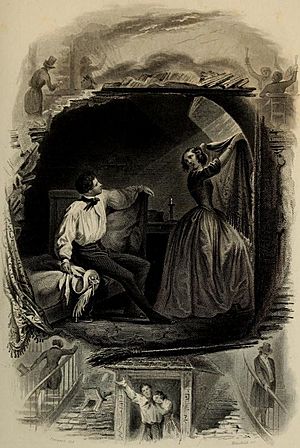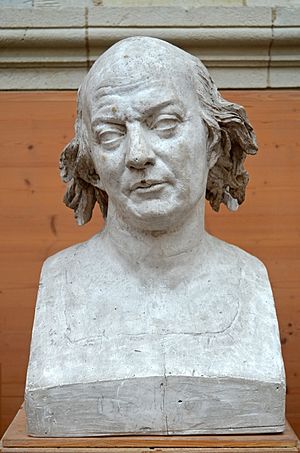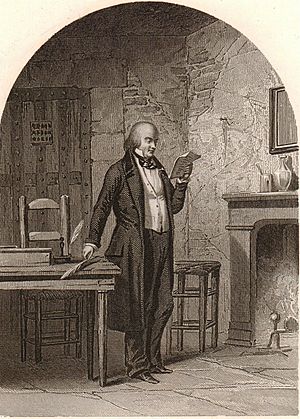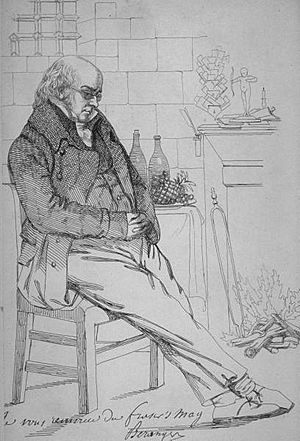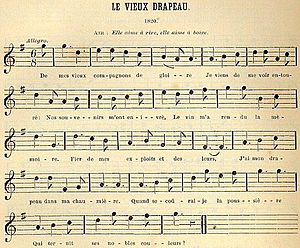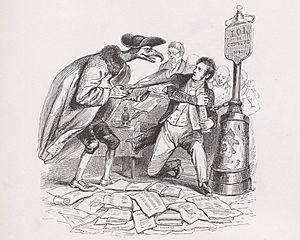Pierre-Jean de Béranger facts for kids
Quick facts for kids
Pierre-Jean de Béranger
|
|
|---|---|
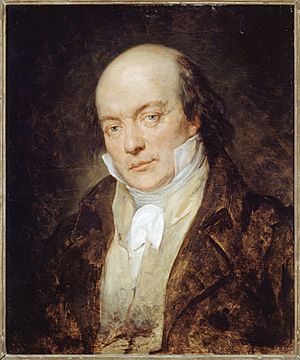
Pierre-Jean de Béranger
|
|
| Born |
Pierre-Jean de Béranger
19 August 1780 |
| Died | 16 July 1857 (aged 76) |
Pierre-Jean de Béranger (born August 19, 1780 – died July 16, 1857) was a very popular French poet and songwriter. He was famous in France during his lifetime. People called him "the most popular French songwriter ever" and "the first superstar of French popular music." However, after he died, his fame faded.
Some newspapers from Malaysia and Seychelles have said that he composed the music for "Allah Lanjutkan Usia Sultan" (an anthem in Malaysia), the Indonesian folk song "Terang Bulan", and "Negaraku" (Malaysia's national anthem). But there is a debate about whether he ever wrote any melodies at all.
Contents
About Pierre-Jean de Béranger
His Early Life and Career (1780–1803)
Béranger was born in Paris, France. He was born in his grandfather's house on a busy street. Even though his father used "de" in their name, Béranger was not from a noble family. His family came from humble backgrounds, like an innkeeper and a tailor. He often wrote about his simple origins in his poems.
As a child, Béranger was shy and often sick. He was good with his hands and could carve small things. He went to school in Paris. From his school's roof, he saw the storming of the Bastille in 1789. This event was a big part of the French Revolution. He later wrote a poem about it.
His father had to hide during the Revolution because he supported the king. So, Pierre-Jean went to live with his aunt in Péronne. His aunt taught him about republican ideas. He learned to love France deeply and disliked foreign things.
He attended a special school in Péronne. Boys there learned about politics and war through games. Béranger was a leader in his school's club. He even gave speeches to important politicians who visited Péronne.
He didn't learn much grammar at school. He learned it later from a printer named Lainez, where he worked as an apprentice from age 14. This is where he started to love writing poetry. He read works by famous French writers like Fénelon, Racine, and Voltaire.
In 1796, he moved back to Paris to help his father's business. But in 1798, the business failed, and Béranger became very poor. This difficult time inspired some of his poems, like "The Garret" and "My Coat." He wrote many poems but was still very poor and sick by 1803. He had only a few clothes. A kind friend named Judith Frere helped him. She stayed with him until she died, just before he did.
Becoming Famous (1804–1821)
Feeling desperate, Béranger wrote a letter to Lucien Bonaparte, who was Napoleon's brother. He also sent some of his poems. Lucien Bonaparte liked Béranger's work. He even gave Béranger some money from his own pension. Five years later, in 1809, Béranger got a job as a clerk at the Imperial University of France. This job gave him a steady income, and his life became more stable.
He had already written many songs for fun gatherings. Some were even published by his father. But Béranger didn't think they were very important. It wasn't until 1812 that he decided to write down his best songs. The next year, his reputation as a songwriter grew. His songs, like "Les Gueux" and "Le Roi d'Yvetot" (a funny song about Napoleon), became very popular. People sang them everywhere.
The Napoleonic wars had a big impact on Béranger. France was invaded, and Napoleon was defeated. After the king was restored to power, Béranger started writing songs against the government. He didn't like how the government was acting. He wrote about the good old days of the republic. He became known as the national poet of France.
Béranger's first book of poems came out in 1815. Even though it didn't have many political songs, it was very popular. His boss warned him not to publish similar things. But Béranger didn't listen. He published another book in 1821 and then quit his job.
Time in Prison
Béranger's second book of songs sold very well. But it also led to legal trouble. He was taken to court and fined 500 francs. He also had to spend three months in Sainte-Pélagie Prison. However, his prison cell was actually more comfortable than his old, poor home. Even in prison, he kept writing songs.
His third collection of songs didn't cause any trouble. But his fourth book, published in 1828, led to a harsher punishment. He was fined 1,100 francs and sentenced to nine months in La Force Prison. The government offered him a lighter sentence if he didn't defend himself. But Béranger refused. He wanted to stand up for his beliefs.
His Most Successful Period
This was a very important time for Béranger. He had a lot of influence among those who opposed the government. People asked for his advice and respected him. He was fair, loved freedom of speech, and was kind. He didn't want power for himself. He was also very generous and liked helping young people. All these qualities made him loved by the French people, especially common folk. A book of his song lyrics was published in 1836. It had many pictures by a French artist named J. J. Grandville.
His songs, like "Le Vieux Drapeau" (The Old Flag), helped start the July Revolution in 1830. He helped put Louis Philippe I on the throne. But Béranger refused all the jobs the king offered him. He just wanted to live simply, earning money from his songs and staying independent. He did ask the king for a pension for his friend, Rouget de Lisle. Rouget de Lisle wrote the "Marseillaise" (the French national anthem) and was old and poor. In 1833, Béranger published his fifth book of songs.
After the French Revolution of 1848, Béranger was elected to the Constituent Assembly. He didn't want the job, but so many people voted for him that he felt he had to accept. Not long after, he managed to resign. This was the last public event in Béranger's life.
His Retirement Years
Béranger tried to live a very quiet life in retirement. He kept working on his songs. Many famous people visited him, including writers and politicians. People said he was a kind person. He was ready to accept help when he needed it, and always ready to help others. His letters were known for being wise and kind.
During this time, he became a big supporter of a struggling artist named Antoine Chintreuil. Béranger bought his paintings, paid for his art supplies, and wrote many letters to help him find buyers.
He wrote a book of his memories. He also started writing a book about "Social and Political Morality," but he didn't finish it before he died. When he was very sick, the street where he lived was full of people who cared about him. His death made the whole country sad. People worried that his funeral might cause political unrest. But the government made sure everything was peaceful. The streets of Paris were lined with soldiers and quiet townspeople. People occasionally shouted, "Honor, honor to Béranger!"
His Famous Songs
Béranger is called "the most popular French songwriter of all time." In the 1800s, no other songwriter in any country had as much influence as Béranger had on the people of Paris. Like all chansonniers, he wrote only the words (lyrics) for his songs. He didn't write the music. He used old, well-known melodies, like folk tunes. For example, "Le Roi d'Yvetot" was sung to a traditional tune.
Béranger's songs are well-crafted. They have a clear, lively style, full of cleverness and sharp ideas. They are known more for their clever phrases than for their flowing melodies. No matter the topic, his writing style remained smooth and clear. He worked very carefully, writing no more than 15 songs a year. He was so particular that he threw away a quarter of what he wrote.
Béranger humbly said about himself, "I am a good little poet, skilled in the craft, and a careful worker. Old tunes and a small choice of subjects have brought me some success." But his humble words don't show how important he was in literature. When he started writing songs, it was seen as a small, unimportant type of art. It was only for light, funny topics. Béranger made songwriting more respected and added deeper feelings to it.
See also
 In Spanish: Pierre-Jean de Béranger para niños
In Spanish: Pierre-Jean de Béranger para niños
- Jacques-Antoine Manuel
- Goguette
Selected Recordings
- Le Pape musulman & autres chansons: Arnaud Marzorati, Yves Rechsteiner, Freddy Eichelberger. Alpha.
Portraits
- Ary Scheffer, oil painting, around 1830, Musée de la Vie romantique, Paris.
- David d'Angers, profile, medallion.
- David d'Angers, bust in plaster.
 | Madam C. J. Walker |
 | Janet Emerson Bashen |
 | Annie Turnbo Malone |
 | Maggie L. Walker |


